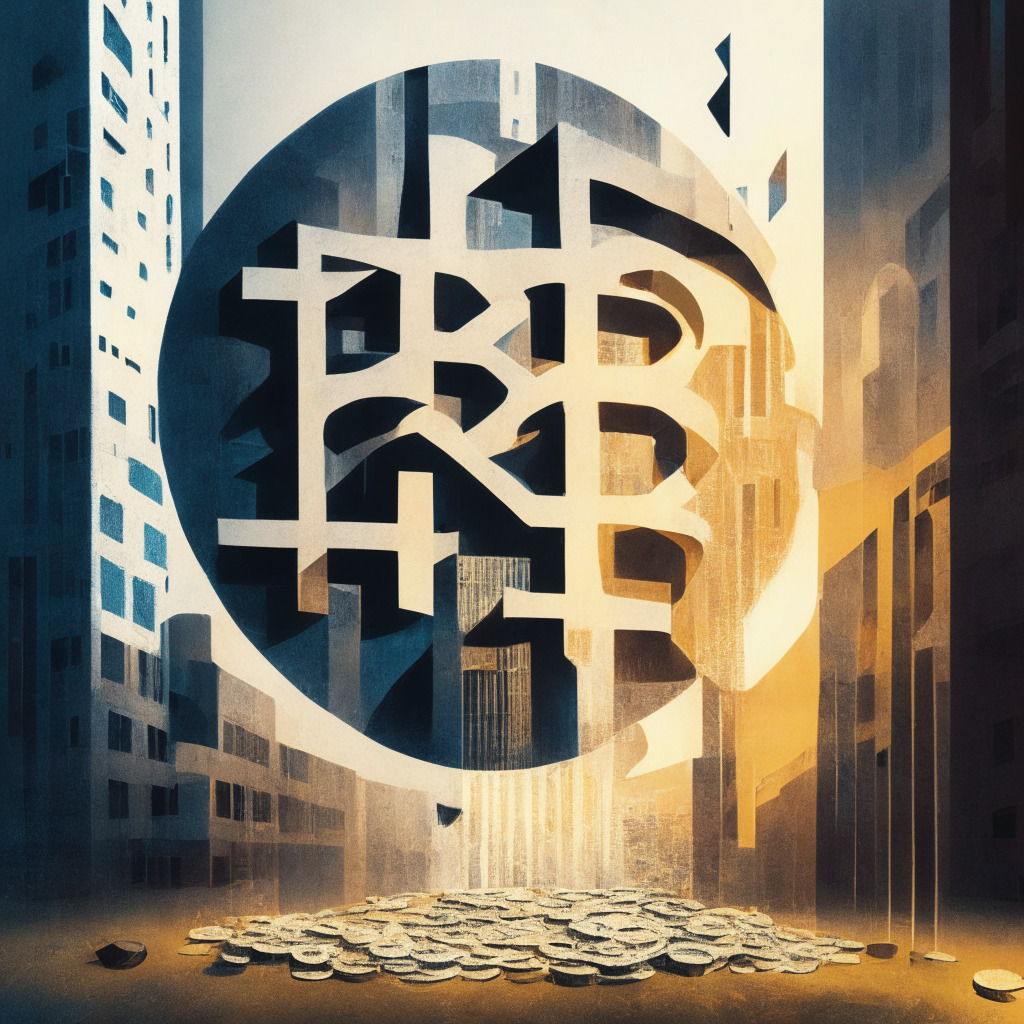In the midst of global economic uncertainty, gold’s reliability shines while a gold token, XAUT, experiences a market rise implying a bullish sentiment. Emerging prospects like the TG.Casino, a GambleFi project, blending blockchain’s decentralised advantages with casino gaming, are gaining traction.
Search Results for: Safe
Reeling from Scams: Challenges to Crypto Safety in Hong Kong Amidst Web3 Era
The Hong Kong crypto community was victim to a costly phishing scam, with fraudsters impersonating Binance and swindling users out of more than $450,000. Amid rising technology crimes, the local police, through its CyberDefender program, are emphasizing prevention and education about risks associated with the digital universe.
Navigating Cyber Threats in Crypto: FTX Hack and Safety Measures in a Bankman-Fried World
“The FTX hack saw over $400 million siphoned off from FTX’s coffers, coinciding with Sam Bankman-Fried’s high-profile trial, potentially providing cover for such illicit activities. These unexpected breaches in security have signaled the need for the evolving and relentless vigilance in our industry.”
UK’s FCA Ramps up Crypto Regulation: Safety Necessity or Market Growth Barrier?
The UK’s Financial Conduct Authority (FCA) has recently added major cryptocurrency exchanges to its warning list as “non-authorized firms”. This is due to concerns over the exchanges operating without essential licenses or adherence to UK regulations, potentially making customers vulnerable. To resume operations, these exchanges need to register with the FCA or secure a temporary status permit. The FCA has also tightened promotion regulations, requiring clear risk warnings and higher technical standards, including a mandatory 24-hour cooling-off period for new users.
Crypto Safety: Navigating Vulnerabilities with Concordium’s Web3 ID Platform
“In an era where cryptocurrency scams are tricky, identity verification becomes an imperative preventative measure. Lars Seier Christensen, founder of Concordium, emphasizes its necessity stating, “To prevent scams, there has to be some level of identity verification.” Concordium’s Web3 ID platform, ensures user control over their data, and minimum discrepancy in personal information, constituting a significant stride toward safer crypto transactions.”
Canadian Securities Administrators Unveil Interim Framework for Stablecoin Issuers: Ensuring Safety or Stifling Creativity?
“The Canadian Securities Administrators (CSA) has unveiled a framework to guide exchanges and issuers of stablecoins, aiming to enhance transparency and trust. The rules require stablecoin issuers to maintain sufficient reserves with a qualified custodian and disclose crucial platform information, underscoring the need for investor information and protection.”
Uzbekistan’s Crypto Mining Revolution: Regulatory Safety Net or Growth Barrier?
Uzbekistan’s National Agency for Advanced Projects (NAAP) released new regulations for cryptocurrency mining, permitting only legal entities to mine using solar photovoltaic stations. These rules aim to provide transparency and predictability, while discouraging unlicensed mining activities, ensuring system safety and reliability, and permitting legal miners to trade on licensed crypto exchanges.
Crypto Security Alert: $700M Lost in Q3 2023, Reflecting on Weaknesses in Blockchain Safety
“The third quarter of 2023 witnessed a loss of about $700 million in digital assets due to 184 security incidents, according to a report by CertiK. Major causes included private key breaches, exit scams, and oracle manipulation, underscoring blockchain security imperfections. Despite these challenges, the industry continues to evolve with focus on increasing security standards.”
Crypto Scams and Increased Regulatory Scrutiny: A Double-Edged Sword for Investor Safety
The US Commodity Futures Trading Commission (CFTC) has cracked down on Mosaic Exchange Limited and its owner, Sean Michael, for fraudulent digital asset commodity practices. While regulatory bodies are stepping up their game against fraudulent cryptocurrency activities, the rise in ransomware and increased sophistication of crypto-crime highlight the need for vigilant investors.
Crypto Giant’s Fall: Regulating for Safety or Stifling Innovation?
The arrest of 3AC’s co-founder, Su Zhu, following the fund’s dramatic collapse, evidences the power regulators hold over cryptocurrency activities. For some, it confirms the need for regulatory frameworks in the volatile crypto world, protecting against violations and malpractice, whilst critics argue against measures that could stifle crypto market innovation.
Binance vs. Paysafe: The Euro Conversion Crunch and Its Implications for Crypto Users
Binance, facing debanking difficulties, has urged its European users to convert Euros to Tether (USDT) due to unilateral action by banking partner, Paysafe. The latter halted processing EUR deposits for Binance users, requiring the alternative stablecoin transformation to maintain liquidity while seeking new banking solutions. This reflects the strategic challenges crypto exchanges face amidst tightening regulatory landscapes.
Hong Kong’s Controversial Stance on Crypto: Safety Measures or Hindrance to Mass Adoption?
“Hong Kong-based crypto exchange Hashkey HK has started trading Avalanche (AVAX) but with a specific condition – only professional investors with a portfolio exceeding $1 million can trade AVAX. Hashkey HK mandates users deposit $1,500 for KYC verification.”
Chase UK’s Crypto Transaction Restrictions: Safety Measure or Infringement of Financial Freedom?
“Chase UK imposes restrictions on all cryptocurrency-related transactions for UK residents, hindering customers from conducting crypto activities via debit cards or bank transfers. While aimed at preventing cryptocurrency fraud and scams, critics view this as a barrier to financial freedom and growth in cryptocurrency investment.”
Unmasking Crypto Safety: The Upbit Incident, Imposter Tokens, and Market Resilience
South Korean cryptocurrency exchange Upbit recently resumed Aptos (APT) transactions after a temporary suspension caused by counterfeit token infiltration. A fraudulent APT token named “ClaimAPTGift.com” infiltrated around 400,000 Aptos wallets, leading to some users selling these fake tokens. Upbit initiated a refund process for those affected and reinstated APT transactions after painstaking wallet checks.
Billionaire Mark Cuban’s Cryptocurrency Heist: A hard Lesson on Crypto Safety
Billionaire investor Mark Cuban recently lost nearly $900,000 in crypto from his hot wallet in a swift heist. The security breach highlights the inherent risks of dealing with cryptocurrencies, stressing the need for robust anti-money laundering, fraud detection, and regulatory measures. Even seasoned investors like Cuban are reminded to maintain vigilance and ensure precautions when interacting with these digital assets.
Bitcoin Miner Returns Massive Accidental BTC Transaction Fee: Lessons in Community Ethics and Safety
A Bitcoin miner returned an overpaid transaction fee of $500,000 to Paxos. The fee, paid for a $2,000 transaction, was believed to be due to an error. Rather than distribute the windfall, the miner returned it, showcasing excellent integrity and contributing to the sense of mutual respect in the crypto community.
Regulatory Tightrope: Striking Balance between Crypto Transparency and Investor Safety
U.S. Sen. Sherrod Brown’s call to regulators for promoting transparency and safeguarding investor interests suggests a push for stronger authority over digital assets. This results in questioning the readiness of the crypto enthusiasts to embrace potential regulatory changes in the crypto realm.
Deutsche Bank’s Foray into Crypto: Assured Safety or Regulatory Nightmare?
“Deutsche Bank has partnered with crypto safekeeping specialist, Taurus to establish digital asset custody and tokenization services. They have lodged for a crypto custody license from Germany’s financial regulator, indicative of digital asset custody plans for early 2021. This partnership signals the rising potential of tokenized financial assets.”
California’s AI Cloning Bill: Safeguarding Rights or Stifling Creative Progress?
Assembly Member Ash Kalra has proposed legislation aimed at safeguarding actors, artists and entertainers against the exploitation of AI clones. The bill seeks informed consent in employment contracts for digital replicates of individuals, highlighting a real threat within the entertainment industry.
Regulatory Dilemma in Crypto Finance: Safety or Innovation?
The Monetary Authority of Singapore (MAS) imposed a nine-year prohibition on Three Arrows Capital (3AC) founders for violating Singapore’s securities laws. They failed to disclose new business representative induction and risk management inadequacies. This illustrates the importance of transparency and strong structures in crypto finance.
Gracy Chen’s Dual Approach: Championing Crypto Safety Amid an Evolving Digital Landscape
Gracy Chen, managing director of Bitget cautions about privacy concerns with Worldcoin tokens potentially exposing personal information. She advocates for maintaining skepticism in the dynamic crypto market while also acknowledging the opportunities found within the industry. With a balanced perspective, she deconstructs the complexities of the blockchain technology and digital currencies.
Understanding the SEC’s Crackdown on Crypto: Regulatory Overreach or Market Safeguard?
Binance.US has criticized a ‘compel and reply’ motion by the SEC, calling it overly arduous and unreasonable. The SEC’s demand for details from Binance’s top executives has been countered, arguing that these executives don’t have exclusive knowledge regarding the topics exploring in the consent order. The ongoing situation intensifies the friction between regulatory bodies and crypto institutions on the scope of information demanded and the legitimacy to serve such demands.
Dissecting Project Sela: Orchestrating the Safe Future of Central Bank Digital Currencies
“Project Sela showcases the potential of central bank digital currencies (CBDCs), implementing a novel intermediary approach to reduce liquidity risk. Dealing with concerns about cybersecurity and privacy, it signals a future where transactions settle directly on the central bank’s ledger, inspiring global central banks’ digital transformation.”
Thailand Crypto Fraud: A Tale of Triumph, Regulatory Challenges & Investor Safety
Thailand’s Cyber Crime Investigation Bureau arrested five individuals associated with a fraudulent crypto investment platform that swindled over $27 million. The incident highlights risks associated with the industry and suggests the need for evolving regulations amidst persistent worldwide scams. Despite new regulatory measures, usability and investor protection still pose significant challenges.
Lido Finance and the ERC-20 Security Flaw: Navigating Uncertain Waters in Crypto Safety
Despite a known security flaw in its token contract, Ethereum staking protocol Lido Finance ensures the safety of Lido DAO (LDO) and staked-Ether (stETH) tokens. The flaw reportedly allows “fake deposit” attacks, deviating from the usual Ethereum standards. The issue arises when a transfer’s value exceeds user holdings, generating a false positive rather than stopping the transaction. While this brings uncertainty, it’s a reminder for thorough testing before integrating new tokens.
Emerging G20 Crypto Regulations: Trading Anonymity for Safety, or a Blow to Decentralization?
“G20 is implementing an international framework for crypto assets that promotes regulatory compliance within the blockchain industry. Although this move is a significant step forward, it raises concerns about user privacy and counters the fundamental decentralized ethos of blockchain technology.”
Senator-Proposed AI Regulation: Balance between Safeguarding Innovation and Ensuring Accountability
Senators Richard Blumenthal and Josh Hawley released a cross-party plan for comprehensive AI regulation, proposing mandatory licensing for AI firms and enforceable AI safeguards. The framework also aims to balance potential benefits and risks of AI technology through corporate transparency, consumer protection, and national security safeguards.
Google’s Softened Stance on Crypto-Ads: A Boon for Blockchain World or a Safety Rigor?
“Google has updated its cryptocurrency ad policy to permit ads from cryptocurrency gaming companies promoting blockchain-based non-fungible token (NFT) games. The change, effective September 15th, excludes games promoting gambling or gambling services. While this shows a more inclusive approach, Google still maintains stringent rules to protect consumers from potential scams and maintain control over crypto-related advertisements.”
Navigating the Labyrinth of Crypto Regulations: A Dual Perspective on Blockchain Progress and Safety
“In the realm of crypto regulations, authorities are tightening grips to mitigate potential risks. The situation sheds light on the increased scrutiny towards prominent crypto figures while emphasizing the importance of regulatory measures. Meanwhile, the emergence of blockchain and digital currencies surfaces concerns about impacting traditional banking systems, creating regulatory complexities.”
The Ethereum Supreme Court: A Radical Notion to Enhance Blockchain Safety and Stability
Matter Labs CEO, Alex Gluchowski, suggests the creation of an “Ethereum Supreme Court” to mediate disputes that could impact the Ethereum blockchain’s integrity. His proposed system aims to formalize Ethereum’s “social consensus layer” to safeguard platforms against exploitation, enabling community-engaged contract-based mediation in crisis scenarios.
UK’s Vision for Global AI Safety: Tackling Risks and Encouraging Development
The UK government focuses on the risks and policy support for AI at the upcoming global AI safety summit. The discussions will address the risks posed by AI systems, fostering AI development for public good, and establishing international consensus on AI safety.
Unraveling Ronaldinho’s Alleged involvement in a $1.2 Billion Crypto Tragedy: Lessons for Digital Safety
Former soccer star Ronaldinho Gaucho is implicated in a cryptocurrency pyramid scheme involving company 18k Ronaldinho Comércio e Participações Ltda. Accusations include deceiving investors with promises of 2% daily return rates. Ronaldinho refutes these claims, citing name misuse in company establishment.































